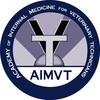Small Animal Internal Medicine
Veterinary Small Animal Internal Medicine is defined as the specialty branch of veterinary medicine concerned with non-surgical diseases in animals. All specialties of AIMVT are further defined to include the advanced knowledge of wellness and preventative medicine, a detailed knowledge of complex, acute and chronic disease states, and a thorough knowledge of the anatomy, pathology and pathophysiology of animals.
Veterinary technicians working in small animal internal medicine are often working in the following areas:
NOTE: While there is some overlap between the skills and knowledge used in both small animal internal medicine (SAIM) and emergency and critical care medicine (ECC), these are separate and distinct specialties within veterinary medicine. Veterinary Technicians interested in applying for certification as a Veterinary Technician Specialist (VTS) in SAIM are advised to ensure that all cases selected as part of their application are within the specialty of SAIM and not ECC (e.g. trauma, toxicology) or other specialties .
Veterinary Small Animal Internal Medicine is defined as the specialty branch of veterinary medicine concerned with non-surgical diseases in animals. All specialties of AIMVT are further defined to include the advanced knowledge of wellness and preventative medicine, a detailed knowledge of complex, acute and chronic disease states, and a thorough knowledge of the anatomy, pathology and pathophysiology of animals.
Veterinary technicians working in small animal internal medicine are often working in the following areas:
- Conditions involving the gastrointestinal tract. Including those of the esophagus, stomach, pancreas, and the small and large intestine. Some of the diseases in this system are inflammatory bowel disease and pancreatitis. Also the diagnosis and treatment of conditions involving diarrhea, esophageal dysfunction, and vomiting.
- Clinical nutrition; including dietary issues, prescription diets, and the management of obesity and weight loss.
- Disease conditions involving the urinary system; including the kidneys, ureters, urethra and urinary bladder.
- Diseases of the endocrine system, including but not limited to: conditions of the adrenal, parathyroid, pituitary and thyroid gland(s), endocrine pancreas and theriogenology.
- Conditions and diseases of the liver, including but not limited to: Copper storage disease, chronic active hepatitis, portosystemic shunts, and hepatic lipidosis.
- The study and treatment of respiratory conditions, including diseases of the nasopharnyx, larynx, upper and lower airways.
- Hematologic disorders and disorders of the bone marrow, including but not limited to: clotting disorders, anemia, transfusion medicine, and Mycoplasma infections.
- Infectious diseases including but not limited to: FeLV, FIV, FIP, heartworm, babesiosis, rickettsial infections, Lyme disease, and leptospirosis.
- Pharmacology including indications, contraindications, drug interactions, and adverse drug effects
- Dermatology
- Immunology
- Perform pain assessments and general anesthesia including administering, monitoring, and recovery for patients with internal medicine conditions
NOTE: While there is some overlap between the skills and knowledge used in both small animal internal medicine (SAIM) and emergency and critical care medicine (ECC), these are separate and distinct specialties within veterinary medicine. Veterinary Technicians interested in applying for certification as a Veterinary Technician Specialist (VTS) in SAIM are advised to ensure that all cases selected as part of their application are within the specialty of SAIM and not ECC (e.g. trauma, toxicology) or other specialties .
